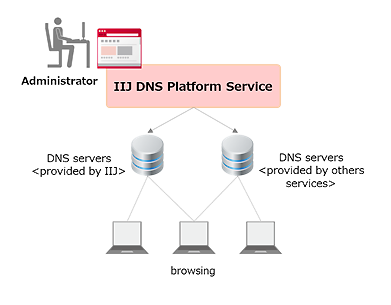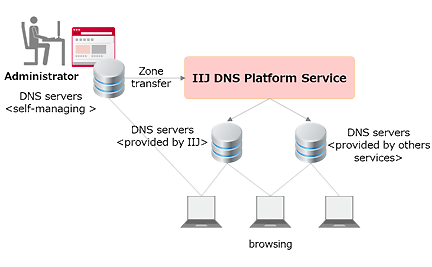Top of Page
- Links to move inside this page.
- HOME
- About IIJ
- News / CSR
- Press Releases
- 2019
- IIJ to Launch IIJ DNS Platform Service
IIJ to Launch IIJ DNS Platform Service
Offering a higher level of availability and failure resistance by combining the infrastructure of multiple DNS providers
November 27, 2019
TOKYO-November 27, 2019-Internet Initiative Japan Inc. (IIJ, TSE1: 3774), one of Japan's leading Internet access and comprehensive network solutions providers, today announced that it has refined its outsourcing service for domain name system (DNS) servers. This new IIJ DNS Platform Service will launch on December 9, 2019.
DNS is the framework that links IP addresses to domain names. Through IIJ DNS Platform Service, IIJ administers and manages DNS servers for its customers. With its previous DNS services, IIJ has been enhancing availability by improving network bandwidth and using servers distributed throughout Japan and abroad. However, it will now provide an update to these services in the form of IIJ DNS Platform Service, thereby realizing a higher level of availability and failure resistance. The new service offers a world-class DNS service equipped with all industry-standard security functions, including DNSSEC(*), and multiple providers support, which enables the use of DNS infrastructure from multiple companies through IIJ's service. By adopting the service, clients have access to system frameworks that can endure larger-scale attacks, ensuring that users can deploy DNS servers without worry.
- (*)DNSSEC (DNS Security Extensions): An electronic signature technology developed to improve DNS safety by detecting unauthorized modifications to DNS data.
Background
DNS is a fundamental Internet technology employed when Internet users browse websites or send and receive email. However, in recent years, there has been an increase in cyberattacks targeting DNS servers, and coordinated DDoS attacks or attacks targeting vulnerabilities often cause downtime for DNS servers. In 2016, the world's largest DNS service suffered a DDoS attack of more than 1.2 Tbps, causing notable global sites that used the service to incur a series of failures.
Amid the recent growth in cyberattacks, the industry recognized that no single DNS service could defend against such attacks, and corporations that operate websites have begun to use the DNS services of multiple companies. However, combining DNS services from multiple providers places a high administrative burden on users, so IIJ decided to offer a higher-level service through which users can use various DNS infrastructure platforms through one IIJ service.
About IIJ DNS Platform Service
The service offers a high degree of flexibility in terms of system configuration options that conform to user administrative policies, from administering DNS servers (primary and secondary) to linking DNS infrastructure platforms from other companies. IIJ offers a basic and a premium plan to meet a wide range of user needs, from entry-level to large-scale websites.
The basic plan offers, at a low cost, the standard security functions needed for DNS services. This plan allows even SMEs to improve DNS server availability while keeping administration costs low.
In addition to the functions of the basic plan, the premium plan provides resistance against larger DDoS attacks through multiprovider support that allows users access to the DNS infrastructures of multiple companies. This expanded functionality results in maximum availability for even those websites often targeted in cyberattacks, including those of leading corporations and government agencies.
- (*)After the migration period, IIJ's previous offerings, DNS Outsourcing Service and DNS Secondary Service, will merge with the new DNS Platform Service.
The new functions available with this updated service are as follows:
Support for multiple providers of DNS servers
The service synchronizes the zone information contained on IIJ DNS servers with the DNS servers that other providers operate, allowing support for all DNS servers. This function allows users access to more than 100 DNS servers worldwide.
Improved security through detailed roles management
In combination with IIJ's cloud-based ID management and authentication control service, IIJ ID Service, DNS Platform Service allows users to add authentication methods besides passwords for use when accessing web management screens. Service users can also set editing and viewing roles for DNS servers at the user level and assign administrators by zone (domain or subdomain).
| Service launch date | December 9, 2019 | |
|---|---|---|
| Service fees | Initial fee | JPY 5,000 |
| Monthly fee |
|
|
Service Description
| Premium | Basic | DNS Outsourcing Service (Reference) |
|
|---|---|---|---|
| Administrative functions | |||
| Edit zone information through the web management screen | o | o | |
| Use multifactor authentication through the web management screen | o *Link with the IIJ ID Service |
o | |
| Separate editing rights per zone | o *Link with the IIJ ID Service |
x | |
| Automation through APIs | (Expected release in April 2020) | o | |
| DNS server equipment | |||
| DNS server installation location | Multiple worldwide locations (IIJ equipment/Equipment from other companies) *More than 100 Anycast locations |
Multiple worldwide locations (IIJ equipment) |
Multiple worldwide locations (IIJ equipment) |
| Combine with DNS infrastructure from other companies (Multiprovider) |
o | x | x |
| Combine with user authoritative name servers | o(Option available for some configurations) | × | |
| QPS maximum(*1) | 200 qps (95% rule) *Available as an additional option |
100 qps (95% rule) |
- |
| SLA | 100% authoritative DNS server uptime | - | - |
| DNS security functions | |||
| Combine with multiple DNS server software packages | o | o | |
| Zone forwarding protection through TSIG(*2) | o | - | |
| DNSSEC | o (Settings only made through the web management screen) |
o | |
| Anti-DDoS bandwidth | More than 30 Tbps | More than 1 Tbps | - |
- (*1)QPS: Queries per second
- (*2)Transaction signature (TSIG): A framework for preventing server modifications through electronic signatures that use shared secret keys and one-way hashing when moving between the primary and secondary server zones
- For more detail about the service, see the following website:
https://www.iij.ad.jp/biz/dns-pfm/ (only in Japanese language) - For more information about IIJ, visit the IIJ Web site at https://www.iij.ad.jp/en/.
- For inquiries, contact
-
IIJ Corporate Communications
 +81-3-5205-6310
+81-3-5205-6310  +81-3-5205-6377
+81-3-5205-6377  press@iij.ad.jp
press@iij.ad.jp
- (*)All company, product, and service names used in this press release are the trademarks or registered trademarks of their respective owners.
Usage case
Case A

Case B

IIJ continually strives to expand its DNS service functionality to provide our clients with a more secure service.
About IIJ
Founded in 1992, IIJ is one of Japan's leading Internet-access and comprehensive network solutions providers. IIJ and its group companies provide total network solutions that mainly cater to high-end corporate customers. IIJ's services include high-quality Internet connectivity services, systems integration, cloud computing services, security services and mobile services. Moreover, IIJ has built one of the largest Internet backbone networks in Japan that is connected to the United States, the United Kingdom and Asia. IIJ was listed on the First Section of the Tokyo Stock Exchange in 2006.
The statements within this release contain forward-looking statements about our future plans that involve risk and uncertainty. These statements may differ materially from actual future events or results.
- Related Contents
End of the page.